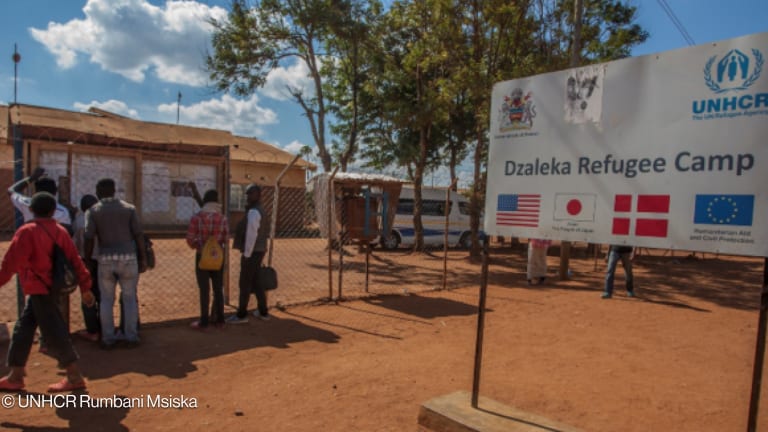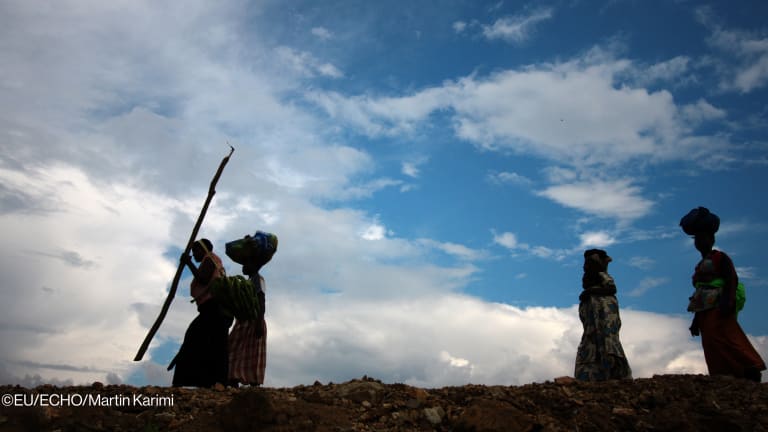By Sara Pavanello and Sara Pantuliano
The populations of many cities in developing countries have soared over the past decade. Estimates suggests that more than half of the population of Sub-Saharan Africa - the world's most rural region - will be living in urban areas within two decades. One prominent feature is the flow into cities of people who have been uprooted by natural disasters and/or conflict.
There are many reasons why they come to the cities. Like other migrants, they are attracted by the perceived availability and better quality of basic services and by the chance to earn a living. Additional ‘pull' factors include the chance to live close to other family members and notions of the greater security that can be found in the anonymity of a bustling city.
Many refugees also migrate to cities for reasons that are related specifically to their own displacement. These ‘push' factors include restrictions on their movements as a result of insecurity or natural hazards. People may have fled from violence, abuse, exploitation or coercion and the risks of forced recruitment into an armed force. Or they may be fleeing from the restrictions of camp life, and a lack of opportunities or basic services.
Most of these displaced people end up facing the same challenges that already confront millions of poor urban residents: no security of tenure; precarious living conditions, often in overcrowded slums; poor access to basic services; insecurity; high levels of unemployment, violence and public health risks, and so on. But refugee and displaced people face additional risks. These relate to their position as ‘outsiders' and make them more vulnerable than their counterparts living in camps or the other urban poor.
Many have experienced human rights abuses and violence and have endured long and harrowing journeys. Such experiences can lead to physical and mental health problems. Research has confirmed that refugees and internally displaced persons (IDPs) often display higher rates of post-traumatic stress disorder than other groups. In addition, they are more likely to be subjected to forced evictions, chronic police abuse, arbitrary arrest and detention, various forms of social and political exclusion, exploitation and physical abuse. Their vulnerability is heightened by the legal limbo in which they often live, and in particular by the absence of secured Housing, Land and Property (HLP) rights. Finally, in some countries, the urban displaced are thought to be among those worst affected by the global food crisis.
It is clear that displacement is not only about camps and settlements and that the issue of urban refugees and IDPs represents a growing challenge for state authorities and humanitarians. But current development and humanitarian approaches and responses are not geared up to address this complex issue. There seems to be an underlying assumption that because these groups live in the cities, they have access to opportunities to earn a living, and need less support than those living in settlements and camps.
International actors are faced with a range of difficulties in their efforts to support these populations. The absorption of refugees into the urban fabric, their dispersal over big cities and their high levels of mobility between and within cities means that they are often defined as invisible or hidden groups. In addition, there are few studies of their situation, and this lack of data hampers still further agencies' efforts to identify and assist them.
On the eve of World Refugee Day it is important to remember the millions of refugees and IDPs living in urban areas. Recent conflicts, for example in Pakistan and Gaza, confirm that those fleeing violence often end up in urban areas, and not only in refugee or displaced camps. They have also highlighted the urgent need to develop and implement strategies that better support displaced populations in urban areas.
Over the next two years, the Humanitarian Policy Group at ODI will be working on displacement in urban areas, researching both urban refugees and those who are internally displaced, in partnership with the Internal Displacement Monitoring Centre (IDMC) and in collaboration with the Feinstein International Center at Tufts University, UN-Habitat and ICRC. We will explore the phenomenon of displacement in the urban environment and the implications and challenges that this poses for humanitarian action. The aim is to improve the effectiveness of the international response, as part of wider support to vulnerable urban communities.
Do you have examples of efforts to respond to displaced populations in urban areas that we can profile in our work? Do you have positive or negative lessons that we can learn? Do join this discussion and give us your views, or email the project team, Sara Pantuliano s.pantuliano@odi.org.uk; Sara Pavanello s.pavanello@odi.org.uk; and Marzia Montemurro Marzia@nrc.ch.
Re-published with permission by the Overseas Development Institute.








